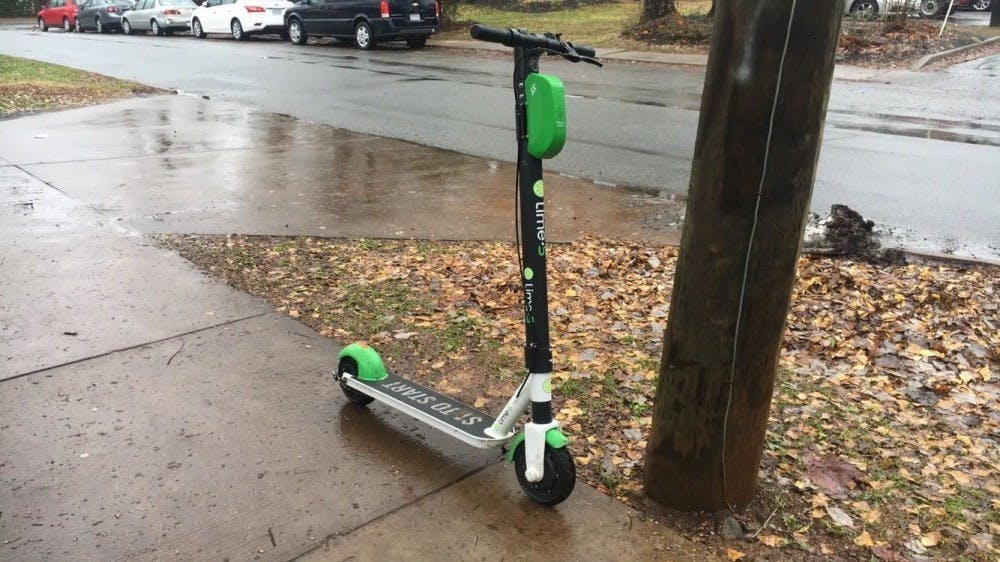If you’ve been to Charlottesville at any point in the past year, you’ve likely seen electric scooters seemingly everywhere. In the span of just a year, these scooters have evolved from what was once a novel curiosity into an integral component of public transit in the Charlottesville region. According to data collected by city officials, 30,000 users have made more than 200,000 scooter rides, collectively traveling more than 200,000 miles since their debut in December 2018. These astounding figures underscore not only the popularity of e-scooters with the general public but also their necessity in the lives of so many in the region.
In spite of this, in late December 2019, Lime, the largest e-scooter company in Charlottesville, announced that it will be ceasing operations after the passage of new regulations by City Council. While there are legitimate concerns regarding rider and pedestrian safety, the manner in which elected officials in Charlottesville have responded to these issues has been anything but appropriate. Specifically, in its letter to city officials, Lime cited two key provisions of the Council’s recent ordinance — one which strictly limited number of scooters and the other which required companies to provide electric bikes in addition to scooters — as key factors contributing to its decision to cease operations.
However, if this past year has illustrated nothing else, it’s that there is an incredible demand for e-scooters in Charlottesville and as such, placing arbitrary limits on the total number of units allowed to operate is both impulsive and premature. The same holds true with the Council’s mandate that companies provide electric bikes in addition to scooters — a service which has consistently proven to be less popular with consumers and more susceptible to theft and vandalism. For these reasons, the University itself is planning to discontinue its own bike rental program, UBike, in May of this year — an action which largely prompted the Council’s decision. However, forcing a company, such as Lime, to offer a service that is obsolete and unprofitable simply because no one else will is like demanding that BestBuy continue to sell floppy disks and cassette players at the risk of being shut down if they protest.
When considering all of these factors, it’s no wonder why Lime, despite its enormous success and loyal following here in Charlottesville, chose to leave. Aside from simply depriving consumers of choice — only VeoRide has chosen to stay in Charlottesville with Bird opting to leave back in July — these onerous regulations will also disproportionately impact individuals who have come to depend on these transportation offerings, particularly students.
Within this particular demographic, the scooters have gained an almost religious following, enabling many, including first-years who are prohibited from owning cars, to cheaply and freely explore parts of Charlottesville well-beyond the Corner. The relative cost-effectiveness of these devices In comparison to rideshare platforms such as Uber and Lyft has been a major selling point for students. Similarly, while UTS and rideshares only operate during select hours, dozens of scooters can be found at a moment’s notice, regardless of the time or location. With students representing an integral component of the local economy, curtailing their mobility, even slightly, will undeniably have an impact on local commerce and reduce overall student engagement with the broader Charlottesville community.
The departure of this venture is especially ironic when considering that Charlottesville likes to bill itself as a community welcoming to tech startups. Lime and other scooter startups chose to expand into Charlottesville precisely for this reason, yet over the course of this past year, this perceived friendliness from city officials has proven to be anything but true. Instead of working with these companies to craft innovative solutions to the unique problems that this new form of technology has created, city officials have been openly hostile. Not only have the actions of city Council been contrary to the overwhelming demand shown by students and city residents alike, but they have explicitly undermined an emerging industry that had provided a host of well-paying, part-time jobs. While placing limits on where these devices can be parked and at what speed they may operate is necessary, forcing these companies to operate at a loss and restricting their expansion leaves a bad impression — one which will serve as a cautionary tale for future tech startups looking to expand into Charlottesville.
Finally, if nothing else, the departure of Lime is the loss of service that was, quite simply, fun. The exhilarating rush of energy and emotion when riding a scooter is almost indescribable and it is precisely this feeling, above all else, which helps to explain their popularity. Ultimately, while many individuals saw these scooters as nuisance and have welcomed their departure, the fun they provided for so many is undeniable, and it is these memories that will live on for years to come.
Thomas Driscoll is an Opinion Columnist for The Cavalier Daily. He can be reached at opinion@cavalierdaily.com.







